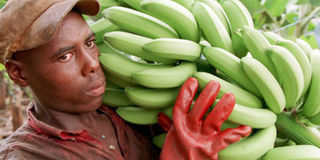Low prices: Add value to your banana and earn more

Farmers are stuck with bananas as prices hit hit record lows. At farm gate, a bunch goes for Shs1,000. File photo
Bananas are experiencing their pandemic. A healthy snack, banana is the world’s most globally exported fruit, according to the Food and Agricultural Organisation (FAO) and that is a reason for worry as the novel Covid-19 continues to bite. Farmers are suffering daily losses.
The price of a medium bunch, which used to command between Shs15,000 and Shs30,000 before the lockdown, has plummeted to Shs6,000.
Isolation measures meant problematic transportation and yet even the markets have been operating at half-mast. The situation became non-remunerative for the farmers after some markets were closed for failure to adhere to Covid-19 guidelines during the time of the total lockdown.
Temporary situation
While Covid-19 is affecting everyone’s day-to-day lives, some things don’t change. People still need to eat to keep healthy while farmers still need to earn money.
Proscovia Mutumba, a crop development specialist with the National Agriculture Advisory Services (Naads) explains that the banana market flooding has always been common in January and July.
“There are a couple of reasons for this situation but the major issue is that some people moved to the rural areas for one reason or another during the Covid-19 lockdown which significantly reduced the market,” says Mutumba.
Value addition
Adding value to farm produce is a key concept in arresting post-harvest losses. According to William Mwegombi, an irrigation engineer with the Presidential Initiative on Banana Industrial Development (PIBID), bananas support many people especially in central and western Uganda, they need to be kept productive. “Good agronomic practices are key and that has been our message to keep farmers reaping even in periods of extended drought. But the focus should now shift to value addition,” says Mwegombi. The fresh produce sector is characterised by a lot of fruit loss during bumper harvests due to lack of skills for value addition to fruit produce.
Uganda sees 70 per cent of its output eaten locally. The country exports and partially locally retails 20 per cent of the fruit. The 10 per cent goes into processing such products as flour, sweet products and traditional liquor. Roast banana is a popular roadside enterprise and a big source of revenue for banana trader. “We are refocusing our mandate as Naads to look at value addition and mechanisation. We are doing very well in production and post-harvesting losses have been tackled,” says Khadija Nakakande, the spokesperson of Naads.
In terms of value addition, President Museveni set up PIBID in 2005. Today, under brand ‘Tooke’, the efforts have come to fruition. Tooke porridge, biscuits, cakes and bread are some of the products being churned out. Such efforts are a means to prolong the crop’s usable life. The possibilities have been explored with Tooke flour exported to Europe, Japan, UAE and North America. A business incubator in Bushenyi, the Banana Industrial Research & Development Center (BIRDC) at Nyaruzinga can be visited by groups to garner knowledge on value addition.
The Uganda Investment Authority (UIA) in collaboration with Uganda Industrial Research Institute (UIRI) are adding their weight on value addition through appropriate processing technologies to produce products such as fruit juice and wine which meet the market requirements.
Deo Mugisa, a juice and wine processor from matooke in Bubwika village, Bunyangabu District is happy for taking the journey into processing.
“Wine and juice add value and longer shelf life to the bananas,” says Mugisa, the founder of Bamugisa Farmers Demonstration and Training centre.
Export tip.
Farmers have to move ahead and adhere to proper food safety protocols to tap into the export market.
This is a laborious process that requires harvesting completely unripe bananas which must be thoroughly rinsed and then transported in controlled temperature containers until they reach their country of consumption.




